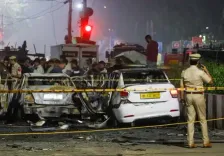Bangladesh Faces Increasing Concerns Over Low-Quality Products Due to Government Neglect: Report

Synopsis
Key Takeaways
- Substandard products increasingly available in Bangladesh.
- Lack of government intervention allowing unethical practices.
- Health risks associated with low-quality food and medicines.
- Call for improved monitoring by BSTI.
- Previous inspections revealed alarming levels of contamination.
Dhaka, March 15 (NationPress) The increase in substandard products in Bangladesh has emerged as a pressing issue for citizens, particularly in Dhaka.
The lack of intervention from the Muhammad Yunus-led interim government has resulted in a rise in the sale of low-quality products for increased profits. The absence of regulations by the interim government allows unethical business practices to flourish, posing a significant risk to public health, local media reported on Saturday.
According to a report from UNB, "Some shops are charging inflated prices for inferior goods, misleading customers into believing they are purchasing premium items. They may also provide discounts on faulty products without disclosing the defects to buyers," shared a frustrated customer.
Another consumer pointed out that numerous electronic devices, cosmetics, and accessories available in Dhaka are either smuggled or unauthorized imports that fail to comply with safety standards.
"These are marketed at appealing prices to attract consumers," another customer told UNB.
Additionally, concerns regarding food safety have intensified, with doctors warning that consuming subpar food and medicines can lead to severe health complications.
Many individuals in Bangladesh feel that the government and relevant authorities have not taken adequate measures to address the situation, allowing dishonest businesses to prosper.
Experts emphasize the importance of bolstering monitoring agencies such as the Bangladesh Standards and Testing Institution (BSTI).
Previously, BSTI announced intentions to initiate a nationwide inspection campaign to guarantee the quality of food items and essential commodities during Ramadan, amidst rising adulteration concerns.
From October 2024 to January 2025, BSTI reportedly conducted 471 mobile court operations across the nation, filing 428 cases and levying fines totaling 24.7 million Bangladeshi Taka, as reported by The Business Standard.
The condition of food safety in Bangladesh remains alarming, as various studies have identified harmful chemicals in vegetables, fruits, fish, poultry, milk, and other food products.
A report from The Daily Star in September of last year indicated that two separate studies found elevated levels of heavy metals and pesticide residues in fruits and vegetables.









